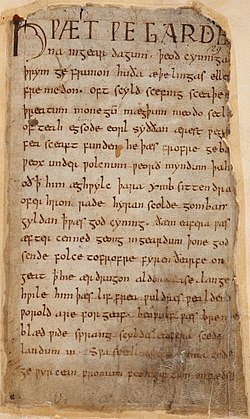Beowulf Story | Adaptations | References | Navigation menuIntroducing English Medieval Book History: Manuscripts, their Producers and their Readers
Germanic mythologyEpic poems
Old Englishheroicepic poemADmanuscriptTolkienprotagonistBeowulfGrendelGrendel's motherdragonHrothgarmead hallHeorotGrendelBeowulfGeatlandSwedenmarshesdragonbarrow
Beowulf
Jump to navigation
Jump to search
| Beowulf | |
|---|---|
| Bēowulf | |
 First page of Beowulf in Cotton Vitellius A. xv | |
| Author(s) | Unknown |
| Language | West Saxon dialect of Old English |
| Date | c. 700–1000 AD (date of story), c. 975–1010 AD (date of manuscript)[1] |
| State of existence | Manuscript suffered damage from fire in 1731 |
| Manuscript(s) | Cotton Vitellius A. xv |
| First printed edition | Thorkelin (1815) |
| Genre | Epic heroic writing |
| Verse form | Alliterative verse |
| Length | c. 3182 lines |
| Subject | The battles of Beowulf, the Geatish hero, in youth and old age |
| Personages | Beowulf, Hygelac, Hrothgar, Wealhþeow, Hrothulf, Æschere, Unferth, Grendel, Grendel's mother, Wiglaf, Hildeburh. |
Beowulf is an Old English heroic epic poem. It is not known who wrote it, and there is no agreement as to when it was written. Estimates for the date range from AD 608 right through to AD 1000, and there is no consensus.[2] The poem has only one manuscript source, written about 1010. Beowulf is 3182 lines long. Tolkien describes and illustrates many of the features of Old English poetry in his 1940 essay On translating Beowulf.[3]
The protagonist of the poem is Beowulf. In the poem, Beowulf fights three monsters: Grendel and Grendel's mother, and later in his life an unnamed dragon.
Story |
Hrothgar, a Danish king, has built a big mead hall, which is called Heorot. Hrothgar and his people live a good life and celebrate in Heorot. But then they are attacked by Grendel, who comes to Heorot every night and kills some of Hrothgar's people.
Beowulf is a warrior from Geatland (modern southern Sweden). He hears of Hrothgar's troubles with Grendel. Beowulf and his men leave Geatland to help King Hrothgar.
Beowulf and his men stay the night in Heorot. When Grendel comes to kill them, Beowulf fights him. Beowulf tears Grendel's arm off from his body and sticks it on the wall as a trophy. Grendel runs to his home in the marshes, where he dies. Everyone is happy that Grendel is killed and celebrates.
But the next night, Grendel's mother comes to Heorot and kills many people for revenge and grabs Grendel's arm. Beowulf then goes to the marshes where Grendel and his mother lived. Beowulf fights Grendel's mother and kills her.
Beowulf later becomes a king. He fights a dragon that was living in a barrow. With the help of the young man Wiglaf, Beowulf kills the dragon. Beowulf is wounded in the final battle and dies and crowns Wiglaf as his successor.
Adaptations |
| Wikiquote has a collection of quotations related to: Beowulf |
| Wikimedia Commons has media related to Beowulf. |
The story of Beowulf has often been told in books, plays, and films. Sometimes the full story is told, sometimes just parts of the story. Sometimes the plot is altered. Sometimes only ideas or themes are taken from the story.
Some examples are:
Beowulf (1999 film)
Beowulf and Grendel (2005 film)- Grendel (2007 film)
Eaters of the Dead, a book by Michael Crichton (1976)
Grendel, a book by John Gardner (1971)
The Ring-givers, a book by W.H. Canaway (1958).
References |
↑ Hanna, Ralph (2013). Introducing English Medieval Book History: Manuscripts, their Producers and their Readers. Liverpool University Press. ISBN 9780859898713. Retrieved 6 October 2017..mw-parser-output cite.citationfont-style:inherit.mw-parser-output .citation qquotes:"""""""'""'".mw-parser-output .citation .cs1-lock-free abackground:url("//upload.wikimedia.org/wikipedia/commons/thumb/6/65/Lock-green.svg/9px-Lock-green.svg.png")no-repeat;background-position:right .1em center.mw-parser-output .citation .cs1-lock-limited a,.mw-parser-output .citation .cs1-lock-registration abackground:url("//upload.wikimedia.org/wikipedia/commons/thumb/d/d6/Lock-gray-alt-2.svg/9px-Lock-gray-alt-2.svg.png")no-repeat;background-position:right .1em center.mw-parser-output .citation .cs1-lock-subscription abackground:url("//upload.wikimedia.org/wikipedia/commons/thumb/a/aa/Lock-red-alt-2.svg/9px-Lock-red-alt-2.svg.png")no-repeat;background-position:right .1em center.mw-parser-output .cs1-subscription,.mw-parser-output .cs1-registrationcolor:#555.mw-parser-output .cs1-subscription span,.mw-parser-output .cs1-registration spanborder-bottom:1px dotted;cursor:help.mw-parser-output .cs1-ws-icon abackground:url("//upload.wikimedia.org/wikipedia/commons/thumb/4/4c/Wikisource-logo.svg/12px-Wikisource-logo.svg.png")no-repeat;background-position:right .1em center.mw-parser-output code.cs1-codecolor:inherit;background:inherit;border:inherit;padding:inherit.mw-parser-output .cs1-hidden-errordisplay:none;font-size:100%.mw-parser-output .cs1-visible-errorfont-size:100%.mw-parser-output .cs1-maintdisplay:none;color:#33aa33;margin-left:0.3em.mw-parser-output .cs1-subscription,.mw-parser-output .cs1-registration,.mw-parser-output .cs1-formatfont-size:95%.mw-parser-output .cs1-kern-left,.mw-parser-output .cs1-kern-wl-leftpadding-left:0.2em.mw-parser-output .cs1-kern-right,.mw-parser-output .cs1-kern-wl-rightpadding-right:0.2em
↑ See, for example, Beowulf: a dual-language edition. New York: Doubleday, 1977; Newton S. 1993. The origins of Beowulf and the pre-Viking Kingdom of East Anglia. Cambridge.
↑ Tolkien J.R.R. 1983. Tolkien, Christopher (ed.). The monsters and the critics, and other essays. George Allen and Unwin. ISBN 0-04-809019-0.
Categories:
- Germanic mythology
- Epic poems
(RLQ=window.RLQ||[]).push(function()mw.config.set("wgPageParseReport":"limitreport":"cputime":"0.364","walltime":"0.493","ppvisitednodes":"value":1024,"limit":1000000,"ppgeneratednodes":"value":0,"limit":1500000,"postexpandincludesize":"value":17272,"limit":2097152,"templateargumentsize":"value":1773,"limit":2097152,"expansiondepth":"value":14,"limit":40,"expensivefunctioncount":"value":0,"limit":500,"unstrip-depth":"value":1,"limit":20,"unstrip-size":"value":6547,"limit":5000000,"entityaccesscount":"value":1,"limit":400,"timingprofile":["100.00% 444.700 1 -total"," 41.36% 183.910 1 Template:Infobox_Medieval_text"," 40.13% 178.469 1 Template:Infobox"," 29.46% 131.012 1 Template:Lang"," 22.36% 99.451 1 Template:Reflist"," 18.69% 83.127 2 Template:Cite_book"," 9.95% 44.228 1 Template:Commonscat"," 7.79% 34.642 1 Template:Italictitle"," 6.86% 30.495 1 Template:About"," 4.83% 21.476 1 Template:Use_dmy_dates"],"scribunto":"limitreport-timeusage":"value":"0.218","limit":"10.000","limitreport-memusage":"value":11680423,"limit":52428800,"cachereport":"origin":"mw1268","timestamp":"20190828034317","ttl":2592000,"transientcontent":false););"@context":"https://schema.org","@type":"Article","name":"Beowulf","url":"https://simple.wikipedia.org/wiki/Beowulf","sameAs":"http://www.wikidata.org/entity/Q48328","mainEntity":"http://www.wikidata.org/entity/Q48328","author":"@type":"Organization","name":"Contributors to Wikimedia projects","publisher":"@type":"Organization","name":"Wikimedia Foundation, Inc.","logo":"@type":"ImageObject","url":"https://www.wikimedia.org/static/images/wmf-hor-googpub.png","datePublished":"2008-03-09T15:01:25Z","dateModified":"2019-08-09T11:36:24Z","image":"https://upload.wikimedia.org/wikipedia/commons/c/c1/Beowulf_Cotton_MS_Vitellius_A_XV_f._132r.jpg","headline":"Old English heroic epic poem"(RLQ=window.RLQ||[]).push(function()mw.config.set("wgBackendResponseTime":99,"wgHostname":"mw1269"););